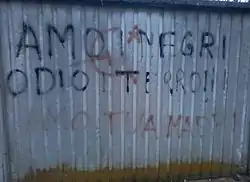Terrone
Terrone (Italian pronunciation: [terˈroːne]; plural terroni, feminine terrona)[lower-alpha 1] is an Italian term to designate, in an often pejorative manner, people who dwell in Southern Italy or are of Southern Italian descent.
The term comes from an agent noun formed from the word terra (Italian for "land"). In fact it was historically used, after the Italian unification, to describe the landlords of the former Kingdom of the Two Sicilies, highlighting the fact that they profited from a type of land property, the latifundium, by which they used to own the land without ever working it; the word also stands for "person from a land [such as Southern Italy] prone to earthquakes".[1]
Until the 1950s, terrone kept the classist meaning of "peasant", that is "person working the land (hence the word terra)"; at one point, even people migrating from the relatively more rural regions of Veneto, Emilia-Romagna and Tuscany to the industrialised Lombardy had been accordingly nicknamed terroni del nord ("Northern Terroni").[2] However, it was not until the Italian economic miracle, when a great number of Southerners migrated to the industrial centers of Northern Italy, that it began to be strictly used (often as a racist slur) to indicate people from Southern Italy. From terrone later derived Terronia "the land of the Terroni", and the adjective terronico "anything related to the Terroni".[1]
The epithet often implies the occurrence of negative stereotypes for the person labelled in such wise, such as laziness, ignorance and lack of hygiene. Similarly, with particular reference to some slang, the term has taken on the meaning of an uncouth person lacking in good manners, like the other Italian words villano, burino and cafone.
In Italy, the term has strongly racist undertones of rejection and has been recognized as a racial insult by the Italian Court of Cassation,[3] because it is also generally associated with certain somatic, phenotypical and physical traits more common to the Mediterranean part of Italy than to the North, such as olive skin, short stature, high cheekbones and other characteristics.
See also
Notes
- In some Northern Italian languages:
- Piedmontese: taron, feminine taron-a [taˈrʊŋ(a)]
- Ligurian: te(r)rón, feminine te(r)rónn-a [teˈɾuŋ(ˑa)]
- Lombard: te(r)ron [teˈrũː], feminine te(r)rònna [teˈrɔna], or terù, feminine terùna [teˈru(na)]
- Venetian: teron [teˈɾoŋ], feminine terona [teˈɾona]
References
- "Da dove arriva questo terrone?, Accademia della Crusca".
- Quarto rapporto sulle migrazioni 1998. Franco Angeli. 1999. p. 160. ISBN 9788846412126.
- "Lo chiamavano "terrone", sarà risarcito". Corriere della Sera. 2005.
Bibliography
- Russo Bullaro, Grace (2010). From Terrone to Extracomunitario: Shifting Demographics and Changing Images in a Multi-cultural Globalized Society. Leicester: Troubador Publishing. ISBN 9781848761766.
